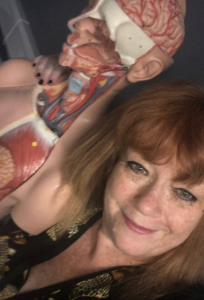 I am a therapeutic radiographer, now in education, proud of our profession and the privilege to have helped people through some of their darkest times: a cancer diagnosis and radiotherapy. What drove me to join the profession as an 18-year-old drives me now: quite simply to care, nurture, show compassion and help. Does that sound a bit clichéd? A little dated now that radiotherapy has such a high technology focus: imaging, protons, MRI treatment machines? Or could it be an opportunity, as is the horrors of COVID-19, to change the culture and put caring and compassion back at the forefront of practice and of life itself?
I am a therapeutic radiographer, now in education, proud of our profession and the privilege to have helped people through some of their darkest times: a cancer diagnosis and radiotherapy. What drove me to join the profession as an 18-year-old drives me now: quite simply to care, nurture, show compassion and help. Does that sound a bit clichéd? A little dated now that radiotherapy has such a high technology focus: imaging, protons, MRI treatment machines? Or could it be an opportunity, as is the horrors of COVID-19, to change the culture and put caring and compassion back at the forefront of practice and of life itself?
Busy schedules, meeting targets and ever-advancing technology could be seen as barriers to the essential humanistic aspects of being a therapeutic radiographer. Treating 50 patients a day, feeling tired, harassed and possibly overworked, but for each individual patient, they have just that one appointment for treatment. A visit that their whole life is structured around, ten crucial minutes that are effectively life-giving. Does our fiftieth patient of the day get as much care and compassion as our fifth patient of the day? Is there a danger that the dreadful phrase of being ‘button pushers’ could become more and more of a reality? Technological advances might reduce our focus on the person we are treating: does someone’s mother, sister or grandmother become ‘the breath-hold breast’ due next?
So what would make that ten-minute appointment time really meaningful, compassionate and caring? Do we value the person we are treating as an individual? Do we see the person first, the patient second and the problem third? Take time to listen, to try to understand and empathise with the individual’s journey and experience? Do we ‘care about’ or just ‘care for’? I suggest these are different things. We care for the person with the skin reaction in a practical way and offer advice, but do we care about them as an individual? The skin reaction that hinders their favourite hobby, so they suffer another loss to normality from their cancer … do we explore the impact this could have on their body image, self-worth or well-being? Is that what compassion, empathy and caring about really looks like? While caring for could be functional and almost technical, caring about is authentic, from the heart and a basic humanistic attribute of those drawn to the vocation of therapeutic radiography. It is altruistic: ‘a selfless concern for the wellbeing of others’.
I believe the same values of caring about transfer to the education setting too. Academics may signpost students to support, extend deadlines and enable their success, caring for in many ways, as a practical form of care. But caring about those students could mean seeing them as individuals first, students second and their problem last, being empathetic, trying to understand their complex lives and the demands on them … making us authentic academics caring about our students as individuals.
I hear you objecting, ‘but that will all take so much more time and I am pushed as it is!’ Perhaps another time we can look to the benefits we get from enacting and caring about people, be they patients or students. But as the pandemic continues, is it time for us to reassess our values as individuals, professionals and humans?
I believe society can be selfish: we put ourselves first, and we are taught to value wealth, possessions and status. But as COVID-19 has reminded us, basic humanistic values, consideration and understanding of others is worth more than status and money. Has the world forgotten what it means to care? Have therapeutic radiographers become so engulfed with targets and technology that we let the core aspects of our role diminish, be that in a clinical or academic setting?
The real test of our culture, our society and us as individuals comes during adversity and I believe COVID-19 has reminded us of that. Caring interactions and compassion for all sentient beings has to be a priority. Can we be knowledgeable therapeutic radiographers, excellent with technology, at the peak of our practice if we place that ahead of compassionate interactions, of caring about people as individuals?
I hope this blog makes us all think a little more about our caring interactions at work, at home and in all aspects of our lives. Let us continue a culture of change, to make a more caring world.
A patient once told me that they presumed their treatment would be accurate and precise, but what mattered most to them was how the radiographers made them feel: listening to them as an individual and remembering what mattered to them. It fits so well with a quote I was recently reminded of: thank you Charlotte, from Maya Angelou, poet, educator, historian, best-selling author, actress and civil-rights activist, who said:
‘I’ve learned that people will forget what you said, people will forget what you did,
but people will never forget how you made them feel.’